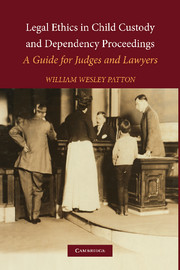Book contents
- Frontmatter
- Contents
- Foreword, by Martin Guggenheim
- Acknowledgments
- Introduction
- 1 Conflicts of Interest
- 2 Competent and Zealous Representation
- 3 Confidentiality
- 4 The Ethics of Alternative Dispute Resolution in Child Custody and Dependency Proceedings
- 5 Ethical Considerations and Constraints in Child Custody and Dependency Appeals
- 6 The Constitutionality of Legislative and Executive Regulation of the Practice of Law and Defining the Attorney-Client Relationship
- Appendix A National Association of Counsel for Children Standards
- Appendix B American Bar Association Standards of Practice for Lawyers Who Represent Children in Abuse and Neglect Cases
- Appendix C In re Car Simulation and Analysis
- Other Authorities
- Cases and Ethics Opinions
- Index
6 - The Constitutionality of Legislative and Executive Regulation of the Practice of Law and Defining the Attorney-Client Relationship
Published online by Cambridge University Press: 24 July 2009
- Frontmatter
- Contents
- Foreword, by Martin Guggenheim
- Acknowledgments
- Introduction
- 1 Conflicts of Interest
- 2 Competent and Zealous Representation
- 3 Confidentiality
- 4 The Ethics of Alternative Dispute Resolution in Child Custody and Dependency Proceedings
- 5 Ethical Considerations and Constraints in Child Custody and Dependency Appeals
- 6 The Constitutionality of Legislative and Executive Regulation of the Practice of Law and Defining the Attorney-Client Relationship
- Appendix A National Association of Counsel for Children Standards
- Appendix B American Bar Association Standards of Practice for Lawyers Who Represent Children in Abuse and Neglect Cases
- Appendix C In re Car Simulation and Analysis
- Other Authorities
- Cases and Ethics Opinions
- Index
Summary
Alex de Tocqueville noted that “people in democratic states do not mistrust the members of the legal profession, because it is known that they are interested to serve the popular cause; and the people listen to them without irritation because they do not attribute to them any sinister designs.” Times have changed. Today, polls by myriad sources indicate that the public's trust and respect for attorneys have atrophied since de Tocqueville's era. It is not uncommon to confront contemporary descriptions of attorneys as “parasites, hired-guns of large corporations or grasping clients, motivated by greed and neglectful of the public good.” The public's principal complaints about lawyers concern (1) perceptions of greed; (2) a minimal commitment to pro bono publico obligations; (3) fomenting a system of nastiness, rather than cooperation through alternative dispute resolution; and (4) a failure of attorney self-regulation to control and cure deficiencies in the attorney-client relationship. For instance, a poll by the American Bar Association found that 42 percent favor expanding “alternatives to lawsuits by encouraging use of mediation, arbitration, and other alternative dispute resolution programs.” And 56 percent of the public believes that “lawyers tend to recommend more legal work than necessary because it increases their fees.”
However, the most critical public attitude is the public's distrust of attorney self-regulation; “lawyer discipline is an oxymoron” according to a majority of the public.
- Type
- Chapter
- Information
- Legal Ethics in Child Custody and Dependency ProceedingsA Guide for Judges and Lawyers, pp. 145 - 164Publisher: Cambridge University PressPrint publication year: 2006



